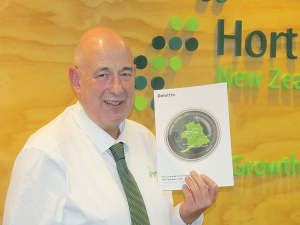The lesson out of the drought this year is that water storage is critical for the prosperity of New Zealand pastoral farms or fruit and vegetable businesses, says Horticulture NZ chief executive Mike Chapman.
The trucking of water to the Waimea Plains this summer is a prime example, he told Rural News.
“The Waimea dam is now in progress, but that will take two or three years, perhaps four,” he said.
“We should be looking at water storage across the country -- small and big schemes. We should be enabling our farmers and growers to store water on their farms a lot easier.
“There is a myriad of resource consents and engineers’ reports to go through to get your storage in place and as a country the one thing we have lots of is water. [But] we don’t capture it when we can to use when we haven’t got it coming. “We need to be a lot smarter.”
Some people are concerned that storage might have environmentally bad outcomes, he says.
“But water storage enables you to have healthy rivers and healthy food; it enables streams and rivers to keep reasonable flow during dry periods.
“And it allows you to growth healthy vegetables and fruit. Our message that is we need water storage for healthy rivers and for healthy food; that is the message we need to get across.
“A lot of water falls in this country; we need to capture it because… it seems we are going to have many more dry periods. So we need water storage to continue growing as a means of first feeding NZ.”
Chapman says we need to emphasise the message of feeding NZ. “We export a lot of our fruit -- about two thirds -- but we don’t export many vegetables.
“We grow for NZ and we need to have land and water to grow for NZ.
“It is interesting that consumer trends are really going across to more fruit and vegetable eating.”
Chapman says growers must persuade “urban NZ to eat a lot healthier, and to eat healthier they need to have good land and water storage”.
Dry to wet, tough
Drought has had a profound effect on vegetable growing this year going into winter, says Horticulture NZ chief executive Mike Chapman.
The glasshouse operations on the Waimea Plain have had to truck in water to survive, which is expensive, he told Rural News.
“You obviously need a consistent supply of water for glasshouses. Because of the drought there weren’t as many NZ vegetables about so we have seen a bit of a downturn there.
“The dry weather will help with fruit sweetness in apples and kiwifruit but now it is starting to rain while the harvest is on.
“For vegetable supply in winter we need reasonable weather for the next few months to [compensate for rain during harvest] and get it working well.
“We need those areas where there is drought to have some rain coming through, and those areas that are now getting rain for it not to be downpours. We don’t want to go from drought to flood.”
Otherwise horticulture is travelling along well, he says, but may not be as strong as the Ministry for Primary Industries Situation and Outlook report suggests. The March update predicts horticulture revenue will grow 15.7% to $6.2 billion for the year ending June 2019.
“It might not be as strong as they are suggesting because of the weather. But if we get a reasonable harvest for apples and kiwifruit things will work reasonably well in terms of that prediction,” Chapman says.



















